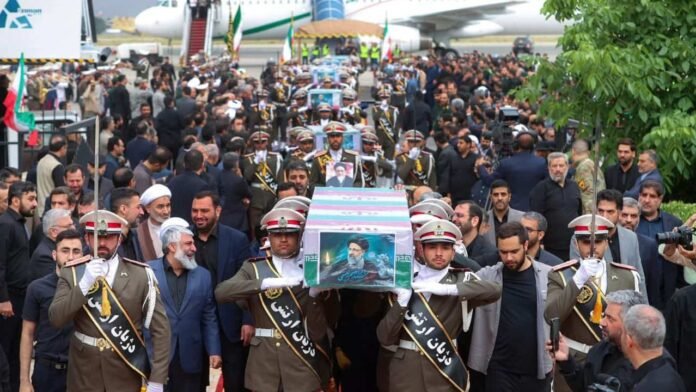President Ibrahim Raisi death sudden demise has placed Iran at a delicate juncture. Yesterday, at the occasion of his funeral prayers in Tehran, the massive turnout not only signalled mourning within the country but also manifested unity and political undertones among the public.
On the other hand, the participation of international, especially Arab, leaders in the funeral procession has somewhat bolstered Iran’s strategic position on the Middle Eastern diplomatic stage.
Following President Raisi’s passing, the world closely observed Iran’s political and strategic response, given the country’s ongoing domestic challenges and regional conflicts, particularly the prolonged conflict in Gaza.
Analysts are keenly observing how power transitions occur in Tehran and drawing parallels with potential indicators. Perhaps reminiscent of the changes Iran may undergo after Supreme Leader Ayatollah Khamenei’s demise.
Contrary to speculations of a power vacuum following Ibrahim Raisi death, Iran demonstrated a semblance of order and control as the Supreme Leader promptly appointed Vice President Mohammad Mokhber as Acting President. As presidential elections are predicted to be held on June 28, simply 39 days after the helicopter incident, the appointment of key diplomat Ali Bagheri Kani as Acting Foreign Minister follows the loss of life of Foreign Minister Amir-Abdollahian.
Iran has grappled with tremendous crises in the past, which it has efficiently navigated. Notably, during the 1980s, Iran faced the Iran-Iraq War, demonstrating the resilience of its institutional framework. The events of August 30, 1981, marked a pivotal moment when President Mohammad Ali Rajai, along with his Prime Minister Mohammad Javad Bahonar. They were tragically killed in an explosion at their office. Highlighting the volatile political landscape during the early years of the Iran-Iraq War.
The crisis resilience became inherent in Iran’s constitution, ensuring stability even after Ayatollah Khomeini’s demise in 1989.
Ibrahim raisins Legacy
Raisi’s presidency, instead of introducing new foundational reforms, focused more on maintaining revolutionary values. During his tenure, he incredibly restrained political reforms while reinforcing the Supreme Leader’s strategic selections.
While Western analysts often viewed Ibrahim Raisi as Ayatollah Khamenei’s successor, Iranians didn’t necessarily agree with this perception. According to Iranian affairs expert Professor Mohammad Marandi, the notion of Raisi becoming Supreme Leader after Khamenei is a Western construct. He emphasized Khamenei’s good health.


